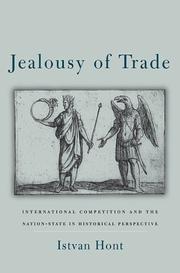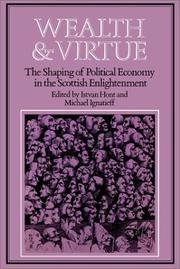| Listing 1 - 7 of 7 |
Sort by
|

ISBN: 0674010388 9780674010383 Year: 2005 Publisher: Cambridge, Mass.: Belknap press of Harvard university press,
Abstract | Keywords | Export | Availability | Bookmark
 Loading...
Loading...Choose an application
- Reference Manager
- EndNote
- RefWorks (Direct export to RefWorks)
Economic schools --- Competition, International --- International trade --- Free trade --- Regional economic disparities --- International economic relations --- History --- History. --- Competition [International ] --- Competition, International - History --- International trade - History --- Free trade - History --- Regional economic disparities - History --- International economic relations - History

ISBN: 0521233976 0521312140 1316044718 0511625073 Year: 1983 Publisher: Cambridge Cambridge University Press
Abstract | Keywords | Export | Availability | Bookmark
 Loading...
Loading...Choose an application
- Reference Manager
- EndNote
- RefWorks (Direct export to RefWorks)
338 <411> --- 338 <09> <411> --- Economics --- -Enlightenment --- -Philosophy, Scottish --- Scottish philosophy --- Aufklärung --- Eighteenth century --- Philosophy, Modern --- Rationalism --- Economic theory --- Political economy --- Social sciences --- Economic man --- Economische situatie. Economische structuur van bepaalde landen en gebieden. Economische geografie. Economische produktie.economische produkten. Economische diensten--Schotland --- Economische geschiedenis--Schotland --- History --- Scotland --- Intellectual life. --- 338 <09> <411> Economische geschiedenis--Schotland --- 338 <411> Economische situatie. Economische structuur van bepaalde landen en gebieden. Economische geografie. Economische produktie.economische produkten. Economische diensten--Schotland --- Enlightenment --- Philosophy, Scottish --- Intellectual life --- Arts and Humanities --- Philosophy

ISBN: 1316044718 0511625073 9780511625077 9780521233972 9780521312141 Year: 1983 Publisher: Cambridge Cambridge University Press
Abstract | Keywords | Export | Availability | Bookmark
 Loading...
Loading...Choose an application
- Reference Manager
- EndNote
- RefWorks (Direct export to RefWorks)
Wealth and Virtue reassesses the remarkable contribution of the Scottish Enlightenment to the formation of modern economics and to theories of capitalism. Its unique range indicates the scope of the Scottish intellectual achievement of the eighteenth century and explores the process by which the boundaries between economic thought, jurisprudence, moral philosophy and theoretical history came to be established. Dealing not only with major figures like Hume and Smith, there are also studies of lesser known thinkers like Andrew Fletcher, Gershom Carmichael, Lord Kames and John Millar as well as of Locke in the light of eighteenth century social theory, the intellectual culture of the University of Edinburgh in the middle of the eighteenth century and of the performance of the Scottish economy on the eve of the publication of the Wealth of Nations. While the scholarly emphasis is on the rigorous historical reconstruction of both theory and context, Wealth and Virtue directly addresses itself to modern political theorists and economists and throws light on a number of major focal points of controversy in legal and political philosophy.
Economics --- Philosophy, Scottish --- Enlightenment --- Economic theory --- Political economy --- Social sciences --- Economic man --- History --- Scotland --- Intellectual life
Digital
ISBN: 9780511625077 Year: 1983 Publisher: Cambridge Cambridge University Press
Abstract | Keywords | Export | Availability | Bookmark
 Loading...
Loading...Choose an application
- Reference Manager
- EndNote
- RefWorks (Direct export to RefWorks)
Philosophy --- Economics --- anno 1700-1799 --- Scotland
Book
ISBN: 0674286197 0674286170 9780674286177 9780674967700 0674967704 Year: 2015 Publisher: Cambridge, MA : Harvard University Press,
Abstract | Keywords | Export | Availability | Bookmark
 Loading...
Loading...Choose an application
- Reference Manager
- EndNote
- RefWorks (Direct export to RefWorks)
Scholars normally emphasize the contrast between the two great eighteenth-century thinkers Jean-Jacques Rousseau and Adam Smith. Rousseau is seen as a critic of modernity; Smith as an apologist. However, Istvan Hont finds significant commonalities in their work, arguing that both were theorists of commercial society but from different perspectives.
Economics --- Commerce --- Trade --- Business --- Transportation --- Economic theory --- Political economy --- Social sciences --- Economic man --- Political aspects. --- Philosophy. --- Rousseau, Jean-Jacques, --- Smith, Adam, --- Political aspects --- Philosophy --- E-books --- Rouseau, Jan Jakub, --- Russo, Zhan Zhak, --- Rousseau, John James, --- Rūssū, Jān Jāk, --- Lu-so, --- Ru-xô, Giăng-Giá̆c, --- Rousseau, Jean Jaques, --- Rousseau, Jean Jeacques, --- Rousseau, J. J. --- Rusō, Jan Jakku, --- Rousseau, Gian Giacomo, --- Ruso, Z'an Z'aḳ, --- Rūcō, --- Citoyen de Genève, --- Citizen of Geneva, --- Roussō, --- Rousseau, --- Rūssō, --- Rousseau, Johann Jacob, --- Руссо, Жан-Жак, --- רוסא, זשאן־זשאק --- רוסא, י׳ן י׳ק, --- רוסו, זאאן זאאק, --- רוסו, ז׳אן־ז׳אק, --- روسو، چان چاك --- روسو، ژان ژاك --- 卢梭, --- Rousseau, Juan Jacobo, --- Rousseau, G. G. --- Ruso, Jan Jak, --- Rūsaw, Zhān Zhāk, --- Rūsū, Zhān Zhāk, --- Traffic (Commerce) --- Merchants --- Economic schools --- Rousseau, Jean-Jacques --- Smith, Adam
Multi
ISBN: 9780674286177 Year: 2015 Publisher: Cambridge, Mass. Harvard University Press
Abstract | Keywords | Export | Availability | Bookmark
 Loading...
Loading...Choose an application
- Reference Manager
- EndNote
- RefWorks (Direct export to RefWorks)
Book
Year: 1989 Publisher: Trier Karl-Marx-Haus
Abstract | Keywords | Export | Availability | Bookmark
 Loading...
Loading...Choose an application
- Reference Manager
- EndNote
- RefWorks (Direct export to RefWorks)
| Listing 1 - 7 of 7 |
Sort by
|

 Search
Search Feedback
Feedback About UniCat
About UniCat  Help
Help News
News